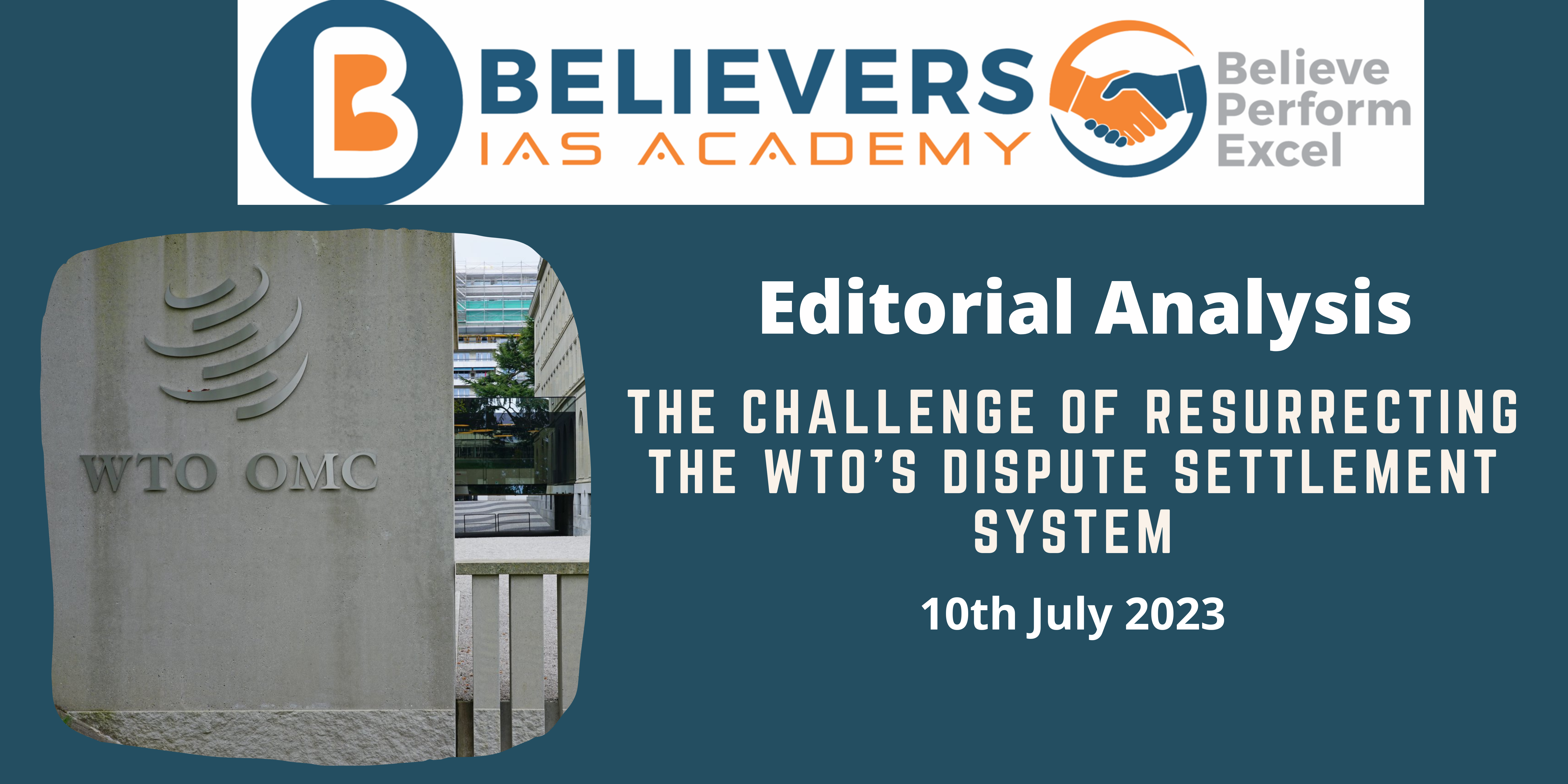The Challenge of Resurrecting the WTO’s Dispute Settlement System
Context:
The World Trade Organization’s (WTO) deal at the Geneva ministerial conference, aimed to revive the WTO’s dispute settlement system (DSS), also known as the organization’s ‘crown jewel,’ by 2024.
Relevance:
GS-02, GS-03 (Bilateral Groupings and Agreements)
Prelims:
- WTO
- WTO’s appellate body
- Anti-dumping duties
Mains Questions:
- What challenges does the WTO face in defining the role of the appellate body and addressing the issue of creating binding precedents? (150 words)
WTO’s Appellate Body and Its Importance in Dispute Settlement
- The Appellate Body of the World Trade Organization (WTO) plays a crucial role in resolving trade-related disputes. Established in 1995, this standing committee comprises seven members who handle appeals against judgments issued in such disputes. With over 500 international disputes and more than 350 rulings since its inception, the WTO’s dispute settlement mechanism is among the most active in the world.
- The Functioning of the Appellate Body:
- The Appellate Body serves as an avenue for countries involved in a dispute to seek a review of panel reports on points of law. It has the authority to uphold, modify, or reverse the legal findings made by the panels that initially examined the issue.
- Between 1995 and 2014, approximately 68% of the 201 panel reports adopted were appealed. Notably, countries on either side of the dispute have the right to file an appeal.
- Over the years, the Appellate Body has issued around 152 reports, contributing significantly to the resolution of international trade conflicts.
- The Significance of the WTO’s Dispute Settlement Procedure:
The WTO’s dispute settlement procedure plays a vital role in ensuring the smooth flow of international trade. Once the reports of the Appellate Body are adopted by the WTO’s disputes settlement body, they become final and binding on the parties involved. This ensures that disputes are resolved in a fair and impartial manner, maintaining the integrity of the multilateral trading system.
Dimensions of the Article:
- The ‘Precedent’ Problem
- Balancing Consistency and Flexibility
- Comparative Precedent Practices
- De-judicialization of Trade Multilateralism
- Voting as a Solution
The ‘Precedent’ Problem:
- The United States criticizes the appellate body for what it perceives as judicial overreach and exceeding its institutional mandate.
- The U.S. argues that the appellate body’s role must be precisely defined before its resurrection can take place.
- A major point of contention lies in the creation of binding precedents through the appellate body’s decisions, which the U.S. views as contrary to the text of the WTO’s dispute settlement understanding (DSU).
Balancing Consistency and Flexibility:
- While there is no rule of precedent in international law, the appellate body plays a crucial role in ensuring consistency in the interpretation and application of WTO agreements.
- The DSU emphasizes that the dispute settlement system provides security and predictability to the multilateral trading system.
- Striking a delicate balance, the appellate body encourages reliance on previous interpretations in cases with similar issues but allows departures from previous rulings and reasoning if “cogent reasons” exist. However, likening this system to common law precedent vastly exaggerates the case.
Comparative Precedent Practices:
- Contrary to the U.S.’s contentions, the appellate body is not the only international court that considers its previous decisions.
- Other international courts, such as the International Court of Justice and the International Tribunal for the Law of the Sea, also rely on past decisions unless compelling reasons warrant deviation.
- Some propose adopting a statement clarifying that appellate body rulings do not create precedents, although the U.S. remains unsatisfied with this approach.
De-judicialization of Trade Multilateralism:
- The U.S. appears to be pursuing the de-judicialization of trade multilateralism as part of its broader strategy. In the neoliberal economic landscape that shaped the WTO’s creation, the law served as the visible hand complementing the invisible hand of market competition.
- The WTO acted as the regulatory mechanism for global trade, legalizing and judicializing international relations. However, de-judicialization, as defined by Daniel Abebe and Tom Ginsburg, involves weakening international courts to regain decision-making power.
- Amid rising geopolitical challenges posed by China, the U.S. seeks greater control over its trade policies and a reduced role for the appellate body’s judicial review.
Voting as a Solution:
- Negotiating with the U.S. to revive the appellate body seems futile. One potential alternative, suggested by Henry Gao, is electing appellate body members through voting at the WTO’s General Council meeting. However, this approach risks antagonizing the U.S., and it remains uncertain whether countries are willing to embark on such a path.
Way Forward:
Resurrecting the WTO’s dispute settlement system demands a careful re-evaluation of the appellate body’s role and the issue of creating binding precedents. It also necessitates addressing the broader trend of de-judicialization in trade multilateralism. Constructive dialogue, innovative solutions, and a collective commitment to upholding the rule of law are crucial in navigating these challenges and preserving the integrity of the WTO.
Conclusion:
The future of the WTO’s dispute settlement system hangs in the balance. The U.S.’s obstructionism, concerns over precedent, and the push for de-judicialization present significant hurdles. Efforts to resurrect the system must prioritize striking the right balance between consistency and flexibility, redefining the appellate body’s mandate, and exploring potential solutions that ensure fair and effective dispute resolution. The international community must unite in safeguarding the multilateral trading system and upholding the principles of international law.




